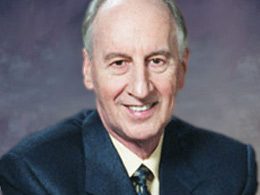 Finding God When You've Failed
Finding God When You've Failed
Jack Hayford
Honesty is indeed a prerequisite to effective prayer. But it can also be cleverly guided on a boomerang path by our arch opponent.
"How can I pray when I know I've failed God?" I may ask myself. The awareness of recent sin or even a remote memory can haunt the mind and cripple all confidence in prayer. Further, I will never feel guilt but that Satan, whom God's Word labels as the accuser as well as the adversary, will hound my mind with added evidence of my unworthiness and, therefore, of my hopelessness if I do pray. "You've botched it up so badly, how can you seriously expect a hearing from God? You don't deserve anything. You know it, and He knows it! Forget it!"
Some of us will even press beyond that lying attack to the point of praying something, somehow
, but the words - when the mind is bombarded by guilt and condemnation - have a way of falling to the floor. Absent is that sense of the creative power when we speak boldly in simple trust to the God of all the heavens. We feel instead like someone who seeks an audience with the head of state of a nation whose flag we have just trampled.
Fat chance of a favor! Thin hope of a hearing! The devil's right. Forget it. But wait a minute.
Think clearly for a moment. What suddenly changed Satan's nature that he would defend God's glory by urging you to keep your dirty distance?
Nothing.
He's consistently opposed to my union and yours with the Father.
When the devil contests a believer on seemingly righteous grounds you can count on it that there's a trap in the system somewhere. Truth starts to surface. The God of all glory is also the God of all grace.
We need to learn how to handle our biggest obstacle to effective prayer: guilt - the sense of having failed and thereby being disqualified for bold approach. How can I handle my dirty linen when I want to come to the throne room of the Almighty?
Any correct teaching of God's infinite mercy has a way of sounding to the presumptuous like a license for sin. But we don't enter God's presence by presenting an admission card certifying our sinlessness. Nor does one stamp into the throne room with muddy feet and a glib, "Sorry about that."
A proper balance of humility and boldness is needed. Sin, by whatever description, cannot be skirted. Neither should sin be honored by allowing it to inhibit our praying.
Here's how to handle the problem:
First, understand God's posture. He's on the side of sinners. Jesus' critics puzzled that He was so frequently in the company of people who lacked religious pedigree and moral status: "This man companies with publicans and sinners!" The amazing thing was not only that He was willing to move among the sinful, but that He affected them and not the other way around. God never condemns sinners, and He never condones sin.
"My little children," John begins,
"I am writing these things to you that you sin not." (1 John 2:1). The message registers, and could produce a guilt feeling just by casual reading…except for the next sentence:
"But if any man sin, we have one pleading our case before the Father - Jesus Christ, the Righteous One. He is our sin-covering." (vs.1-2). In other words, the Word of God says: "Absolutely, do not sin," then turns right around and says, "But when you do..." Although the heavenly Father does not hold a casual attitude toward sin, He is not shocked by it either. He has made provision for it, not as an invitation to sin, but to receive His freedom from its guilt.
Second, we make a serious mistake if we think God's mercy is the result of some "smile-and-forget-it" bent in His nature. Humanistic theology features the Father as a somewhat doddering, near senile, harmless old man who forgives because He couldn't do much else in His defense anyway. Or it says that God forgives whenever He is asked "simply because it's right and He ought to." It's a part of a gentlemen's agreement: We'll forgive God for letting the world go on in the generally messed-up condition it is, if He will be fair about it and forgive us for those times we've contributed to the mess.
Most people never express such ideas or, for that matter, bother to discover what they do think about forgiveness. But to experience the full peace of forgiveness we must understand the key to its power. God's forgiveness is available and adequate because it cost an infinite price: the blood of Jesus.
-
Blood is the only price adequate to cover payment for sin. (Heb. 9:22)
-
Jesus knew and announced that His death on the cross was that instrument of payment. (Matt. 26:28)
-
It was the Father's plan and the Son's agreement to this redeeming event that produced Calvary. (Acts 2:23; Matt. 26:39)
-
This message was foretold by the Old Testament prophets and confirmed by the preaching of the New Testament apostles. (Is. 53:4-6; Jn. 1:29; 1 Cor. 15:3, 1 Pet. 1:18,19)
-
Both justification (acquittal for our sins) in the present and eternal blessing in the future are granted through the blood. (Rom. 5:9)
-
Therefore, peace of mind and a clear conscience before God are available through the blood. (Eph. 2:13,14; Heb. 9:14)
Forgiveness is abundant, but it isn't the splash of a supermarket display. It's the overflow of the cornucopia of His love designed to prompt our praise and thanksgiving...and our bold approach to His throne, even when we have sinned.
That's the third point:
Handling dirty linen in the throne room is not accomplished by attempting to hide it, but by openly spreading it before God. That's what confession means: acknowledging exactly what we know to be so.
"If we confess our sins, He is faithful and just to forgive us our sins and to cleanse us from all unrighteousness." (1 Jn. 1:9)
"Let us therefore come boldly unto the throne of grace, that we may obtain mercy, and find grace to help in time of need. " (Heb. 4:16)
"In time of need." That's the rime we are most encouraged to come. But when need arises - and is compounded by our own sense of sin and failure - that is the time we're least inclined to come boldly. But it's the time we're most invited!
Has your desire to pray been blocked by a sense of guilt?
Be done with that blockade!
Let the truth about the blood of Jesus, the truth about the Father's mercy, set you free!
I can come and be cleansed by the miracle of His creative working through the blood:
"Purge me... and I shall be clean: wash me, and I shall be whiter than snow. Create in me a clean heart, 0 God; and renew a right spirit within me." (Ps.51:7,10)
Welcome to the throne room of heaven, sinner.

 Dr. Jack Hayford served as senior pastor of Church on the Way, Van Nuys, CA from 1969 to 1999, one of the largest churches in Southern California.
Dr. Jack Hayford served as senior pastor of Church on the Way, Van Nuys, CA from 1969 to 1999, one of the largest churches in Southern California.
Hayford is also widely known for his involvement in the Promise Keepers movement, his role as founder and chancellor of The King's University, initiator of the Day of Prayer for the Peace of Jerusalem and for his some four-dozen books and 600 hymns and choruses.
He is the author of the hymn "Majesty," which has proved extremely popular in churches worldwide since it was written in 1978.
This article was reprinted from his book Prayer Is Invading The Impossible. © 1977, Bridge Publishing, Inc. South Plainfield, NJ 07080. Used with permission.
Jack Hayford, 11/22/2010